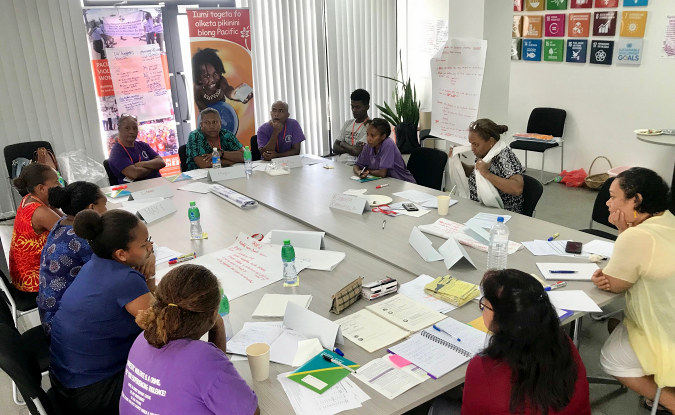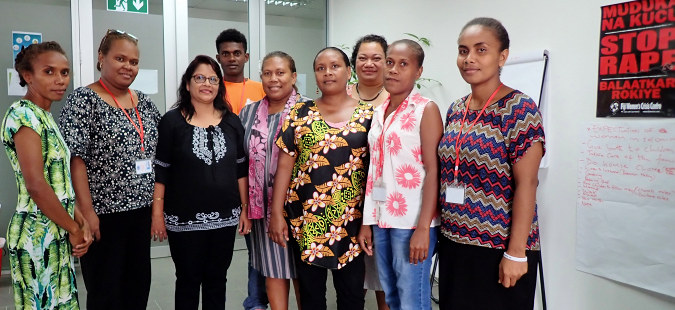Pacific Countries Share Resources to Support Counsellors Helping Family Violence Survivors
Date:

MEDIA RELEASE: Family Support Centre (FSC) Solomon Islands
Wednesday 3 April 2019 (Honiara, Solomon Islands) – Family support and crisis centres across the Pacific continue to assist each other to improve levels of expertise and service to support survivors of family and sexual violence.
Solomon Islands’ Family Support Centre (FSC) has just been supported with training in Honiara by the Fiji Women’s Crisis Centre and UN Women Fiji Multi-Country Office (MCO), following last year’s visit by Vanuatu Women’s Center to help FSC train its volunteer community committees.

The FSC is being supported by sister agencies through the Regional Training Institute under the Pacific Women’s Network Against Violence Against Women, which is chaired by the Fiji Women’s Crisis Centre (FWCC).
FSC’s training from 18-29 March, was funded by the Pacific Partnership to End Violence Against Women and Girls (Pacific Partnership) through the European Union and Australian Government with support from UN Women. The training aimed to assist FSC complete the merger of its case management and counselling units, and then provide staff with improved supervision and self-care support.
“By the end of training we’ve achieved a merged counselling and case management unit,” said Lynffer Wini-Maltungtung, Centre Manager for the Honiara Family Support Centre (FSC), adding that this merger is based on extensive discussions on what would work best in the Solomon Islands.
“The merged unit will now allow more holistic and quality services to the women and children survivors of violence,” Ms Wini-Maltungtung said.
“That’s incredibly important for the survivors of family violence who come to us, so we can ensure each survivor has dedicated support through their journey of recovery and healing.”
“At FSC we’re working hard to ensure we have well-trained family violence counsellors supported by well-coordinated systems, as that will improve our centre’s professional operations and encourage more women and girls to report violence,” she said.
FWCC and UN Women Fiji MCO trainers co-facilitated the two-week training, with the first week focused on core knowledge and skills and the second week on supervision and self-care support for FSC’s staff, including the development of a supervision model.

“The integration of supervision and self-care support aims to reduce the risk of oversight by allowing counsellors space to express themselves, while the self-care support is to ensure that both the mental and physical health of the counsellors is in good shape,” she said, adding that “a counsellor needs to be in good mental and physical health to provide support to their clients.”
The objectives of the two-week training were to: equip counsellors with the core knowledge and skills to effectively provide counselling to women and girls who experience interpersonal violence; train on case management for FSC staff to best support survivors; assess the existing supervision system and partner with FSC to develop a support plan for staff that includes a sustainable supervision system and an organizational self-care plan for counsellors.
“Here in the Pacific our family support and crisis centres are all dealing with the same issue – the highest rates of violence against women in the world – and so it makes sense that we share our resources and support across countries,” said Ms Wini-Maltungtung.
“We are thankful FSC can collaborate with sister agencies to support each other through the Regional Training Institute, which is under the Pacific Women’s Network Against Violence Against Women and chaired by FWCC,” she said.
UN Women Fiji MCO’s support for the training is thanks to the Pacific Partnership that brings together governments, civil society organisations, communities and other partners to promote gender equality, prevent violence against women and girls (VAWG), and increase access to quality response services for survivors. The EUR19.5million regional programme is funded primarily by the European Union (EUR 12.7m) with targeted support from the Australian Government (EUR 6.2m) and cost-sharing from UN Women (EUR 0.6m).
Media queries:
Lynffer Wini-Maltungtung, Centre Manager, Family Support Centre, Email: fsc@solomon.com.sb or Phone: 20619 or 26999